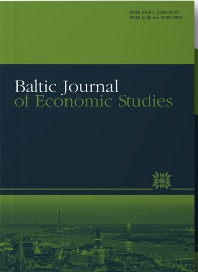id: 36740
Title: Agricultural enterprise development strategy and its efficiency in the modern economic conditions
Authors: Tomashuk I., Timhenko O., Zakharova T.
Keywords: strategy, agricultural enterprises, management, competitive advantages, diversification, potential, planning, innovation
Date of publication: 2024-07-10 09:31:51
Last changes: 2024-07-10 09:31:51
Year of publication: 2024
Summary: The purpose of the article is to study the diversity of approaches to understanding the concept of corporate strategy and to analyse the influence of external and internal environmental factors on its activities, with the aim of forming an effective strategy for the development of an agricultural enterprise. Methodology. In the process of research the basic provisions of modern economic theory, theory of entrepreneurship, scientific works of Ukrainian and international scientists on the problems of strategic development of agricultural enterprises and ensuring their effective operation were used. The following research methods were used in the research process: dialectical, system-structural analysis, monographic, statistical-economic, balance, abstract-logical, graphic, economic forecasting, cartographic. To analyse the innovation strategy for the development of agricultural enterprises, the article uses system-structural analysis, the method of analysis of the functioning environment, correlation and regression analysis, statistical and economic, abstract and logical analysis to substantiate the organisational and economic support for the efficiency of agricultural enterprises, including the diversification of agricultural sectors. The results of the work indicate that the key component of strategic management is a correctly chosen strategy. The main objective of an agricultural enterprise`s strategy is to achieve competitive advantages that will ensure its sustainable operation and economic development in the long term. In order to be effective, the strategy should be as transparent as possible and include not only the setting of priorities, but also the distribution of resources and the definition of responsibilities between actors. The results of the research are presented in the form of tables, figures, graphs, schemes and diagrams. Practical implications. When developing and implementing a strategy, it is necessary to constantly take into account changes that occur under the influence of the external and internal environment, so the strategy should be adjusted in a timely manner. Over time, additions are made to the strategy, and it acquires new qualitative values. Lack of financial, material and technical, information and intellectual resources does not allow agricultural enterprises to successfully develop and implement a strategy even under the most favourable external conditions. Value / Originality. When developing any strategy, it should be borne in mind that even with a well-developed strategy development model, a company can succeed only if it has a qualified management team, combines the efforts of managers and the entire team, and mobilises the creative potential of employees to achieve strategic goals. An important role in the development of a development strategy is also played by the correct selection and use of tools and methods of strategic management and development of the company`s strategy, which can be done using SWOT analysis, other analytical methods, forecasting, portfolio analysis, mathematical methods, etc.
URI: http://81.30.162.23/repository/getfile.php/36740.pdf
Publication type: Статті Web of Science
Publication: Baltic Journal of Economic Studies. 2024. Vol. 10, Issue 2. P. 265-281. DOI: https://doi.org/10.30525/2256-0742/2024-10-2-265-281
In the collections :
Published by: Адміністратор
File : 36740.pdf Size : 1308673 byte Format : Adobe PDF Access : For all

| |
|
|